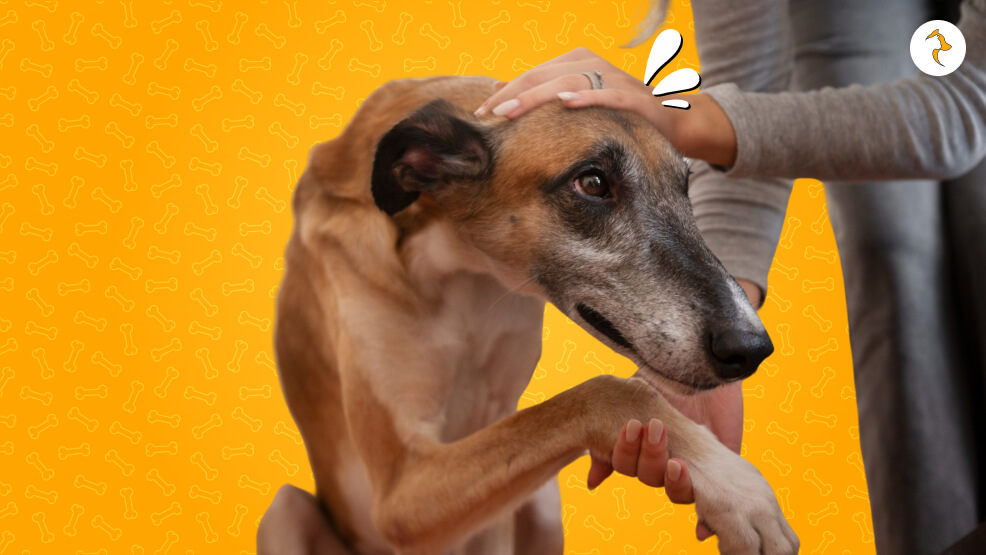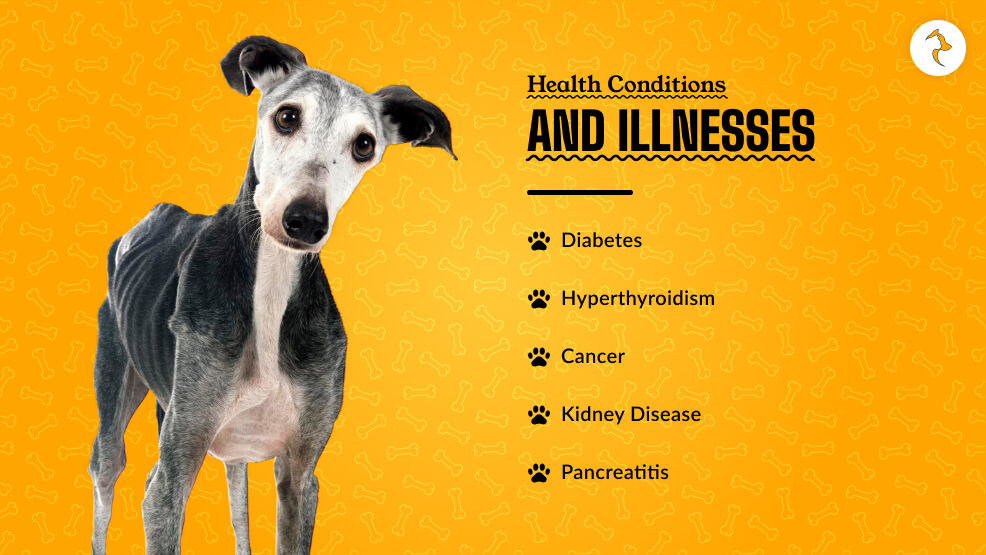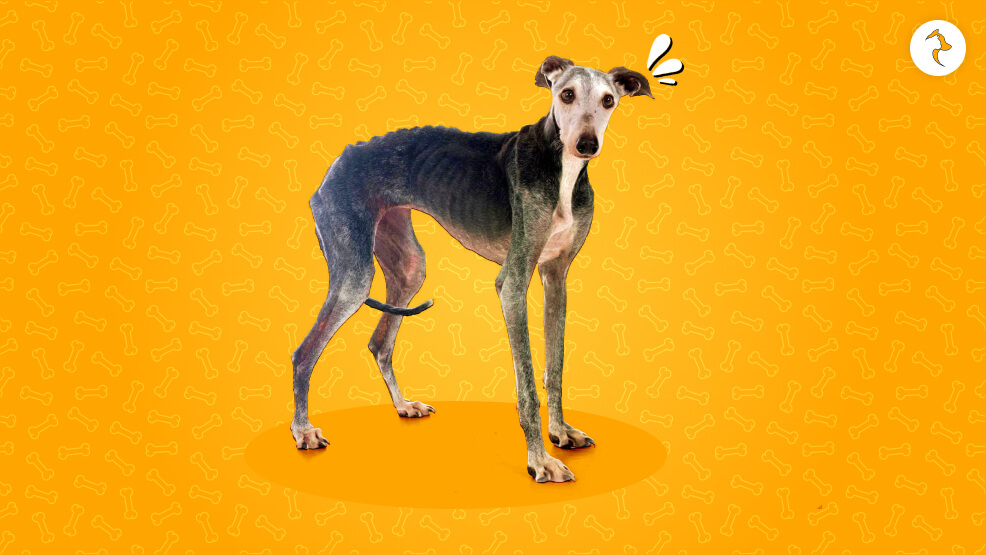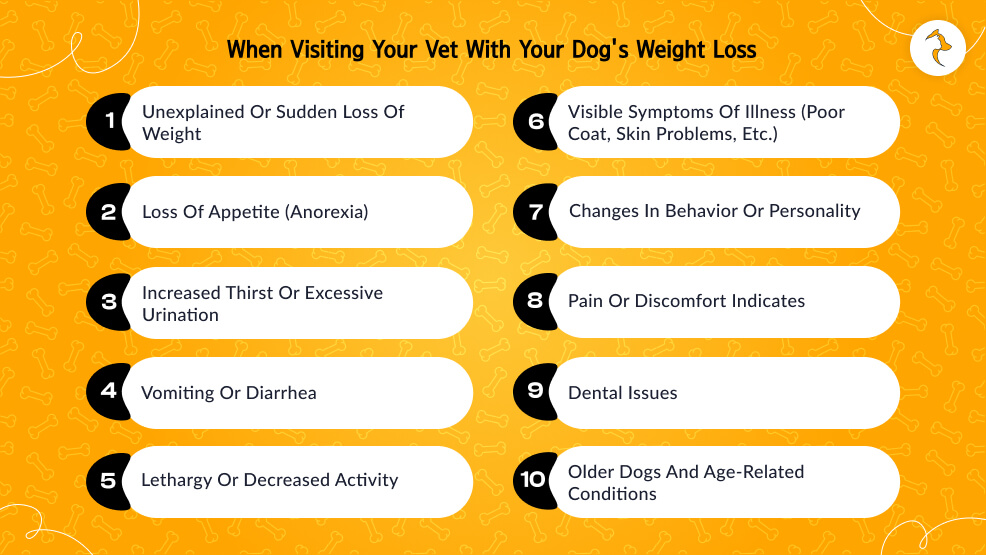Why Is My Dog So Skinny Even Though He’s Eating?


It is very disturbing when your dog seems too skinny or underweight. While some dogs are naturally lean due to breed characteristics, others may be skinny because of health issues, poor nutrition, or other problems.
Knowing why your dog is skinny can help you take the right steps to enhance their health and well-being.
In this in-depth guide, we’ll examine potential reasons why your skinny dog is that way and how to build proper diagnostic abilities. Here’s the first reason that might explain why your dog is skinny.
Natural Body Type or Breed Characteristics
Some breeds, by their very nature, are skinny or lean. Designed to be speedy, Greyhounds, Whippets, Salukis, and Italian Greyhounds have the body type and characteristics of long, thin, lean bodies and low body fat. Toy breeds, such as Chihuahuas, naturally run skinny.
Diagnosis
Skinny might be the new normal if your dog is one breed that rarely gets fat. These dogs tend to have a higher metabolism in their bodies and require quite a lot of energy, given their activity level.
What to Do:
- If the dog appears healthy and active and is eating all the right foods, everything can be fine.
- Just monitor your dog’s weight to verify if they have enough calories and maintain their body condition appropriately.
Malnutrition or Poor Diet
One of the primary causes of skinny dogs is improper nutrition, which can happen when a dog is underfed or not fed properly. Poor quality food, wrong portion sizes, or a diet that does not meet your dog’s specific requirements; high-protein dogs require more fat.
Diagnosis
If the dog is fed with low quality foods, then they are likely not to get the right nutrients; it is a case of changing the food for dogs lately.
Other suggestions would be to ensure their feeding quantities and frequency would lead to losing weight; some dogs that do not eat much lose weight.
What to Do:
- Observe your dog’s food and feeding habits.
- Feed quality dog food that is nutritionally balanced for your dog’s age, size, and activity level.
- If you suspect malnutrition, ask your veterinarian to recommend an alternate food plan or supplementation.
Parasites (Worms or Intestinal Infections)
For example, parasites can interfere with nutrient absorption. Some of them are intestinal worms, giardia, or coccidia, which lead to malnutrition and diarrhea associated with vomiting, so it might be very difficult to maintain a proper weight for a dog.
Diagnosis
The pet is a parasite if it loses weight without wanting to eat and has symptoms like loose stools, vomiting, a dull coat, or worms in the fecal matter.
What to Do:
- A veterinarian can perform fecal tests to determine whether your dog has parasites.
- Treatment is usually medication that will help in getting rid of the parasites.
- In some cases, a specific treatment for intestinal infections might be required. Your dog needs to be dewormed regularly to avoid reinfection.
Health Conditions and Illnesses

Several medical conditions can cause a dog to lose weight and become thin. Some of these conditions prevent the dog from absorbing the nutrients in the food or make the dog burn too many calories. The most common health conditions that cause thinness are:
1. Diabetes
Diabetes makes people lose weight and feel hungrier and thirstier. If insulin is not controlled, then the glucose from food cannot be absorbed properly by the body and thus leads to weight loss.
2. Hyperthyroidism
Hyperthyroidism is an overactive thyroid gland condition that increases metabolic rate and, hence, unexplained weight loss. Other symptoms may include excessive hunger, thirst, and hyperactivity.
3. Cancer
Some kinds of cancers, like gastrointestinal or digestive cancers, result in weight loss. The accompanying symptoms are vomiting, diarrhea, lethargy, and loss of appetite.
4.Kidney Disease
Chronic kidney disease most probably causes loss of weight in the latter stages, where symptoms are increased thirst, urination, and laziness, among others.
5. Pancreatitis
Inflammation of the pancreas leads to abdominal pain or cramping, vomiting or diarrhea, and loss of weight. This condition is usually resultant when the dog loses appetite or often vomits.
Diseases affecting the liver may cause weight loss, vomiting, and alterations in appetite. The liver is very important in digestion, and when it fails, it results in malnutrition.
Diagnosis
If your dog is losing weight and continues to eat or even gain, or he presents other symptoms of illness like lethargy, vomiting, diarrhea, and behavioral changes, veterinary care is important. Several kinds of diagnostic tests may be employed, including blood work, X-rays, ultrasounds, etc.
What to Do:
- During medical conditions, veterinary care is sought immediately.
- These must be diagnosed early to improve the quality of life of your dog.
- Your vet may recommend a treatment, medication, or diet to help your dog.
Stress or Anxiety

High stress or anxiety results in loss of weight. This could be due to loss of appetite, upsets in the gastrointestinal tract, or hyperactivity.
Changes in the environment and separation anxiety, to say the least, are the presence of other animals that can instill fear within a dog.
Diagnosis
Your dog is perhaps dealing with a significant change in his life: new houses, new pets or family members, or a recent traumatic experience, and he eats less or acts out; this could be the work of anxiety.
Common manifestations of anxiety are destruction, excessive barking, and changes in eating or sleeping patterns.
What to Do:
- If stress or anxiety is the problem, reduce environmental stressors and provide your dog with a calm, safe environment.
- Behavior modification techniques, additional exercise, or products such as pheromone diffusers or anxiety wraps may be helpful.
- A veterinarian or animal behaviorist can help develop a treatment plan in more severe cases.
Too Much Exercise or Activity
Dogs usually lose weight either by being overexerted or having a wrong diet. Some breeds that fall in this group include the working and sporting breeds that tend to have more energy and burn more calories than consumed.
Diagnosis
If your dog appears to be very active, most likely due to regular exercise or play, and is receiving what looks like an adequate ration for daily needs, they are likely losing weight for the price.
Symptoms of overactivity include constant movement, inability to sit still, and exhaustion following exercise or work.
What to Do:
- Ensure your dog has enough calories to meet his energy requirements.
- You may increase the portions in quantity or feed high-calorie food when there is a high energy expenditure.
- Good exercise versus diet balance may be related to healthy weight.
Age-Related Changes
As dogs age, they can also suffer from weight loss caused by metabolic changes, reduced appetite, or inability to eat due to dental or other health conditions associated with aging.
Older dogs are less active but still require the appropriate balance of nutrients to keep their weight.
Diagnosis
If your dog is geriatric, over 7 years of age, or according to the breed, and he is losing weight despite having a good appetite, it may be due to some age-related reasons, like slower metabolism or dental issues.
Other age-related health conditions, such as arthritis or cognitive decline, may also be contributing factors.
What to Do:
- Schedule a vet checkup to rule out some age-related health issues.
- Ensure that your older dog is placed on the right food meant for his or her age. Senior dog food contains appropriate nutrients and is softer in the mouth so that he doesn’t lose too much weight.
When Visiting Your Vet with Your Dog’s Weight Loss

Weight loss in dogs can be frightening, but fluctuating weight is normal in all dogs to some extent, while any high or unexplained weight loss never is.
In this case, do note of anything and seek veterinary service whenever the case persists. These signs or circumstances tell when the time is right for vetting your dog because it has lost its expected body weight.
1. Unexplained or Sudden Loss of Weight
If your dog loses weight without any apparent reason and quickly, it may be a cause for alarm. Sudden weight loss could be a sign of diabetes, kidney disease, gastrointestinal disorders, or even cancer.
When To See the Vet: If your dog has lost more than 10% of its body weight in a short time (a few weeks), this warrants an immediate visit to the vet.
2. Loss of Appetite (Anorexia)
Sudden loss of appetite and refusal to eat may be symptomatic of a medical condition that can include dental conditions, digestive disorders, liver disease, and even the pain of arthritis. Loss of appetite with weight loss is dangerous and leads to malnutrition if continued.
When To See the Vet: Bring your dog to the vet immediately if they stop eating or have drastically reduced their food consumption for more than 24–48 hours.
3. Increased Thirst or Excessive Urination
Polydipsia (overdrinking) or polyuria (excessive urine production) are the latter signs of such serious diseases, like diabetes or kidney disease.
Hormonal balance problems often cause those behaviors, too, and all can be linked with weight loss, so take your pup to the vet and let them tell you.
When To See the Vet: A visit should be made when your puppy overconsumes liquids or tends to pee a little more, even when he experiences weight loss.
4. Vomiting or Diarrhea
If your dog has frequent vomiting or diarrhea, he may not even be able to absorb most of the nutrients he ingests and thus lose weight.
Some possible causes include gastrointestinal infections, parasites, and chronic diseases such as pancreatitis or inflammatory bowel disease.
When To See the Vet: If your dog vomits or has diarrhea persistently for over 24–48 hours, or it is heavy, a visit to the vet will be required to identify the cause.
5. Lethargy or Decreased Activity
Weight loss accompanied by lethargy, a significant decline in energy, or loss of interest in activities they would otherwise enjoy may indicate an underlying health issue.
Sick dogs may also appear tired or weak because their body can no longer maintain their state of energy.
When To See the Vet: If your dog is lethargic or inactive and losing weight, immediately take it to the veterinarian.
6. Visible Symptoms of Illness (Poor Coat, Skin Problems, etc.)
Weight loss with seeming changes in the coat, skin, or even the general appearance of your dog, such as thinning, dullness, or excessive shedding, must be due to some nutritional inadequacy or any illness which might be a form of thyroid disease, worms, infections, etc.
When To See the Vet: Whenever you sense your dog is changing his coat, skin, or appearance due to losing weight. Immediately visit your veterinarian to exclude diseases like hypothyroidism, allergies, and so on.
7. Changes in Behavior or Personality
Behavioral changes such as irritability, confusion, an excess of thirst, and a greater than usual vocalization combined with weight loss usually indicate more serious problems. There may be cognitive dysfunction and possibly pain or neurological disorders.
When To See the Vet: Have your veterinarian check your pet to see if they are displaying behaviors unusual to the point where they have a disoriented look besides experiencing weight loss.
8. Pain or Discomfort Indicates
Therefore, it is highly likely that the cause of such weight loss is some kind of discomfort, like limping and failing to move around due to pain; it can be arthritis or some dental conditions and even injuries inside a dog’s body.
When To See the Vet: If your dog manifests pain and weight loss, he should be brought to a veterinarian because a veterinarian must see two issues: pain and weight loss.
9. Dental Issues
This will sometimes leave your dog unable to eat properly, and weight loss over some time is the outcome. If your dogs’ teeth are damaged or infected and painful, they simply will not want to eat, thus causing weight loss.
When To See the Vet: If your dog exhibits any of the following signs – bad breath, drooling, loss of appetite, mouth sensitivity, and weight loss – it is time to take your dog to your veterinarian for an oral exam.
10. Older Dogs and Age-Related Conditions
Weight loss tends to be more common in older dogs associated with conditions like arthritis, cognitive dysfunction, or failure of any organs.
While some weight loss can be normal during the aging process of a dog, significant or rapid weight loss is generally not and should be investigated.
When To See the Vet: Consult your veterinarian if your senior dog is losing weight and displaying symptoms of age-related health issues, such as reduced appetite, difficulty moving, or confusion.
Wrapping Up!
It is, therefore, important when pondering why your dog is skinny to carefully evaluate the possible causes, ranging from natural body type and diet to underlying health issues.
Suppose your dog loses weight without an apparent reason, or you see some other sign of illness like vomiting, diarrhea, lethargy, or changes in behavior.
In that case, going to the vet is of utmost importance. They could conduct a proper examination and appropriate diagnostic tests to determine the cause of this so that appropriate treatment may be done, including a diet change, medication, or lifestyle adjustment.
Always consult a vet if one is willing to alter the diet or exercise routine and other treatments of a dog drastically. Proper care and immediate action would result in your dog’s happiness and healthy life.









Leave A Comment